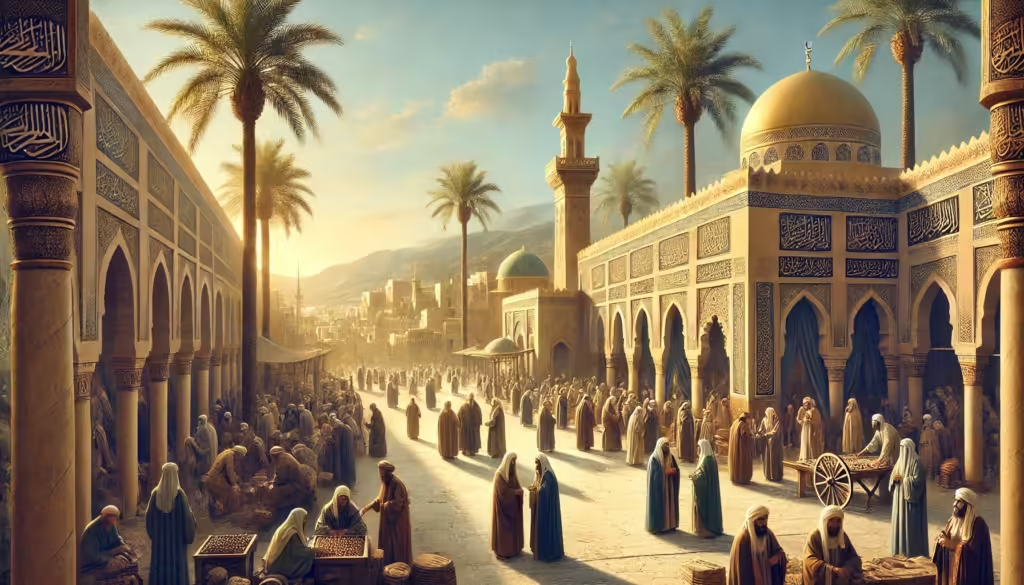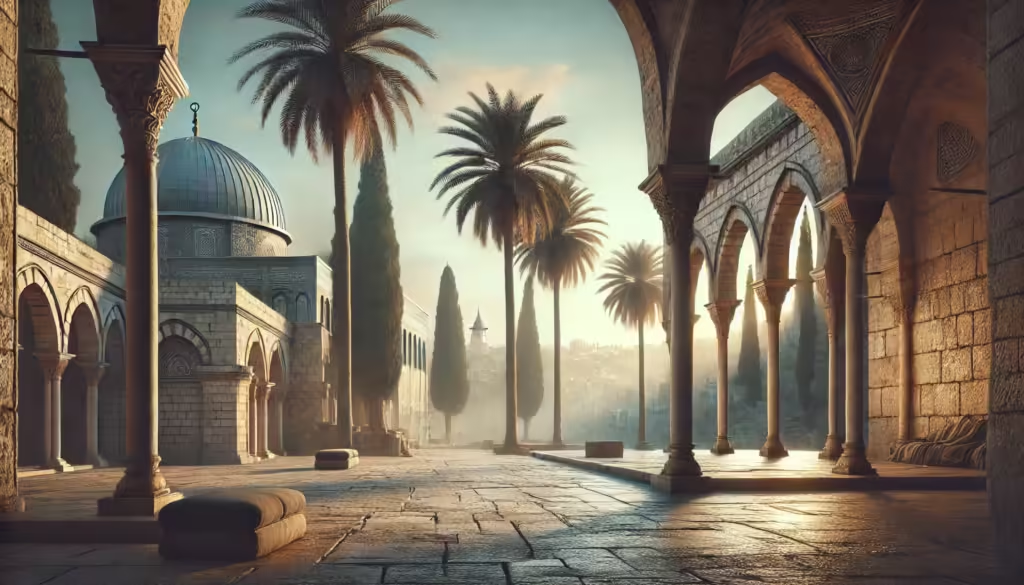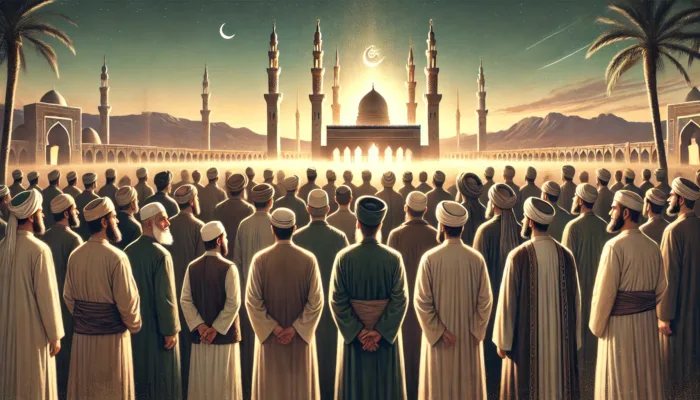Table of Contents
Introduction
This is the fourth article in the series “In the Brightened Corridors of the Prophet’s Life Story“. In this article, we explore a miracle associated with the Prophet (Peace be upon Him) that is often overlooked by many writers. Click here to read the entire series, ALLAH willing.
The Living Miracle: The Prophet’s Companions as a Testament to His Prophethood
In this article, we highlight a miracle of our Prophet Muhammad (Peace be upon Him) that often goes unnoticed: the miracle evident in His noble companions, may ALLAH be pleased with them all.
Imam Al-Qarafi, the renowned Maliki scholar and author of Al-Furuq and other notable works, expressed this beautifully:
“If the Messenger of ALLAH had no miracle other than His companions, they would have sufficed to prove His prophethood”
These words reflect the eloquence of Imam Al-Qarafi and his profound understanding of history’s truths.

Indeed, the companions of the Prophet (Peace be upon Him) were like a living miracle. They had not read any books before meeting the Prophet (Peace be upon Him), nor had they attended universities or embarked on scholarly missions. They had no experience in the governance systems of Persia or Rome, nor had they ever visited these powerful empires.
The Uniqueness of the Companions’ Knowledge and Transformation
Some Arabs, like Urwa ibn Mas’ud Al-Thaqafi and Imru’ Al-Qais, had traveled to Persia, Rome, and Abyssinia before the time of the Prophet (Peace be upon Him), and there were also those who journeyed to the Levant for trade, occasionally meeting with its kings. However, the Prophet’s (Peace be upon Him) closest companions—those who became the pillars of Islam and later, the foundation of the Islamic state—had no teacher but the Prophet (Peace be upon Him) Himself. Their only source of knowledge was the Holy Quran, revealed solely to the Prophet (Peace be upon Him). Yet, despite this, it seemed as if the Arabian Peninsula had come alive, teeming with capable, inspired men.
The Exemplary Leadership of the Rightly Guided Caliphs and Beyond
Looking at the period following the Prophet’s (Peace be upon Him) time, we find remarkable examples in our masters Abu Bakr, Umar, Uthman, Ali, and Mu’awiyah—companions who became exemplary leaders, managing vast territories and empires.
Abu Bakr, may ALLAH be pleased with him, in just two years, transformed the political landscape. He took on leadership during a time when apostasy was widespread, and even Medina, the heart of the Islamic state, was under threat of invasion. Yet he succeeded in restoring security, initiating conquests, and by the time of his passing, Abu Bakr’s armies were engaged in battles against the two greatest empires of the time: Persia and Rome. History records few, if any, who have achieved such a profound turnaround—from a threatened capital to launching significant conquests and establishing a superpower—within such a short period, except for our master Abu Bakr.
Our master Umar, may ALLAH be pleased with him, led a wave of rapid and expansive conquests, with his armies stretching from Tunisia to Persia and even reaching the Caucasus. In a remarkable series of campaigns, he ended the Roman Empire’s presence in the Levant, Egypt, and North Africa, and completely toppled the Persian Empire, capturing its capital.

Our master Uthman ibn Affan, may ALLAH be pleased with him, extended these conquests even further than our master Umar, reaching Kabul in what is now Afghanistan, the borders of Tunisia in North Africa, and the lands of Nubia. Uthman’s era was marked by prosperity, with grants and resources distributed so regularly that people were often called daily to receive their share.
Our master Ali, may ALLAH be pleased with him, skillfully navigated a time of internal strife, managing to uphold the state amid civil conflict.
Our master Mu’awiyah, may ALLAH be pleased with him, resumed the conquests and brought stability back to the Islamic state, ruling for twenty years. Known for his remarkable patience and diplomatic skill, Mu’awiyah guided the state from a period of strife into one of stability, displaying an extraordinary ability to manage conflicts and unify the nation.
This transformation extended beyond politics to the military realm as well. The Arabian Peninsula suddenly became a cradle of warriors—men who, until then, had only known tribal skirmishes. Yet, from them emerged leaders like our master Khalid ibn Al-Walid, may ALLAH be pleased with him, who achieved victories over the Persian Empire and then the Romans.
Our master Sa’d ibn Abi Waqqas, may ALLAH be pleased with him, defeated the Persian forces in the pivotal Battle of Qadisiyyah, while our master Amr ibn Al-As, may ALLAH be pleased with him, led conquests in the Levant and then advanced into Egypt and North Africa. Among these remarkable figures was Abdullah ibn Sa’d ibn Abi Sarh, may ALLAH be pleased with him, who, in his very first naval battle, succeeded in defeating the formidable fleet of the Byzantine Roman Empire, the dominant power in the Mediterranean.
The Companions: A Living Miracle and Testament to the Prophet’s (PBUH) Legacy
This incredible creativity and vitality were brought to life by the Prophet (Peace be upon Him). Before His guidance, these men held little significance. Had the Prophet (Peace be upon Him) not been sent to Mecca, the most that men like Abu Bakr, Umar, and others might have achieved would be limited recognition within Quraysh or, at best, some influence across the Arabian Peninsula. But the Prophet (Peace be upon Him) transformed them into world leaders and historical figures—men whose governance over vast empires remains a subject of study to this day.
Their policies, administrative methods, economic strategies, resource management, military planning, and personal humility all serve as enduring examples.
Consider Umar ibn Al-Khattab, may ALLAH be pleased with him, who led with such asceticism that he ate simple food, content with oil, and wore worn clothes, even as he ruled a vast empire. His humility was so profound that he would sleep under the shade of a tree, prompting a Persian envoy to remark,
“You ruled with justice, so you felt secure and slept in peace, O Umar”
Similarly, our master Ali ibn Abi Talib, may ALLAH be pleased with him, near the end of his life, would say,
“O life, lure someone else; to me you dispose yourself?”
The companions whom the Prophet (Peace be upon Him) nurtured stand as one of his most remarkable miracles. As Imam Al-Qarafi noted, if the Prophet (Peace be upon Him) had left no other miracle than these extraordinary men and the monumental achievements they carried forward after him, it would have been enough.
The Prophet (Peace be upon Him) passed away before Jerusalem was conquered; he was taken there during the Night Journey, yet it was Umar, may ALLAH be pleased with him, who oversaw its liberation.

These men—whom only the Prophet (Peace be upon Him) could bring forth—had studied no book but the Holy Quran, learned solely from the Prophet’s (Peace be upon Him) Sunnah, and were devoted entirely to this faith. This, without doubt, is one of the profound miracles bestowed upon our Prophet (Peace be upon Him).
The Love for the Prophet (PBUH) and His Companions: A Mark of True Faith
Indeed, only those with a deep loyalty and belonging to the Prophet (Peace be upon Him) can truly love His companions, and only those with a deficient faith or a lacking love for this religion would speak ill of them.
We ask ALLAH Almighty to keep us steadfast in our love for the Prophet (Peace be upon Him), His family, and His companions, and to allow us to pass from this life in HIS pleasure, following their path and example. May HE grant us a refreshing drink from the Basin of our Prophet (Peace be upon Him), one after which we shall never thirst again.
Sources:
- Mohamed Elhamy. محمد إلهامي | في أروقة السيرة | 4. معجزة الصحابة. YouTube Video.

